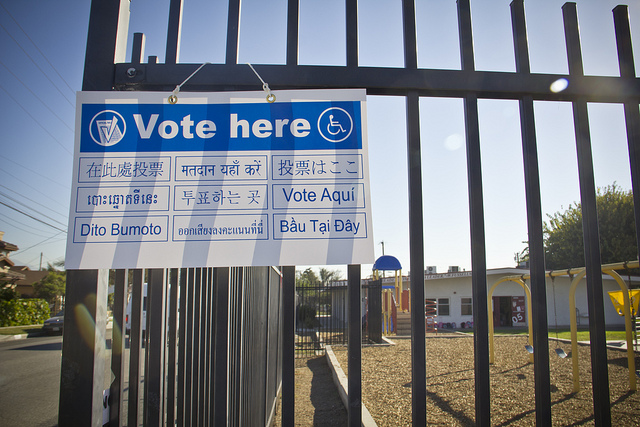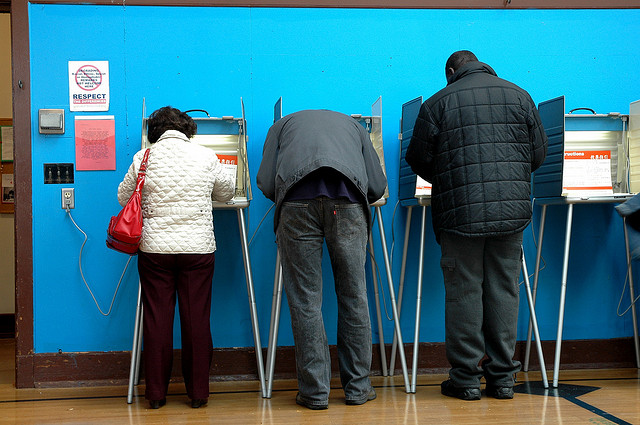Fifty Shades Of Grim Voter Turnout
In an interview with MSNBC/Telemundo Town Hall last week, President Obama commented on low voter turnout.

“In the last election a little over one-third of eligible voters voted,” he said. “If we voted at 60 percent, 70 percent, it would transform our politics; our Congress would be completely different. Staying home is not an option, and being cynical is not an option.”
What the President did not address, however, are the many barriers that prevent citizens from casting a ballot, including lack of time and easily accessible information, complicated voter registration systems, and overall inconvenience.
Election Days
A significant factor in the downward trend of voting can be summed up in a single, two-word question: Why Tuesday?
A non-profit bearing that exact question as its name tried to find the answer. It discovered that, in short, voting takes place on Tuesday because of an arbitrary law enacted in 1845.
“In several states, Tuesday is the only option,” said Jacob Soboroff, who has worked with Why Tuesday? since 2006. “For a student or a single parent or someone working multiple jobs, it sort of sucks to vote on a day that might cost you a paycheck or make you miss an important class.”
Since most of Americans’ polling places are near their houses and many work in areas outside their hometowns, it’s a considerable effort to commute to voting booths before they close.
The good news is that several methods to increase voter turnout are already working their way toward reality.
A handful of politicians, including Sen. Bernie Sanders and former Secretary of State Hillary Clinton, think that Election Day should be a national holiday – a ‘Democracy Day’, as Sanders proposed the name to be.
Others, including Soboroff, think it’d be more effective to have weekend voting. A Weekend Voting Act, sponsored by New York Rep. Steve Israel, was introduced in 2012, but was never enacted.
With the 50th anniversary of the Voting Rights Act approaching in August of this year, however, Congress still has time and incentive to pass effective voting reform laws.
Civic Engagement
If new Election Day laws were to be set in place, though, it would still be the citizens’ responsibility to inform themselves on individual candidates and ballot measures.
That’s where ideas like Glassbooth come in. The non-partisan website active from 2007 to 2010 helped millions of users educate themselves on political topics and choose political candidates. Essentially, the website included a questionnaire on a range of issues that whittled down to candidates who support similar causes as the user.

Though the website is currently inactive, Ev Boyle, one of the founders of Glassbooth, hopes to re-launch it as a mobile app to be up and running before the next midterm elections.
“The goal is to create a sustainable platform for civic education – especially at the local level,” said Boyle.
If the app or something similar proves successful, local elections would certainly be in the most need of it. Since many state and citywide elections occur on off years or on different dates altogether, they face the most abysmal voter turnouts.
“There may have been a thought at one point that, by having local elections that were not simultaneous with the other elections, there’d be more focus on them. But, in fact, that doesn’t happen,” said USC Annenberg Dean Emeritus Geoffrey Cowan, who has done extensive work on political reform.
Voting Technology
The average American adult spends 11 hours per day consuming digital media, so bringing the voting process to the digital space makes sense.
Twenty states have permanent online voting registration as of December 2014. According to the National Conference of State Legislatures, a case study found that online registration decreases costs. Furthermore, Arizona’s Maricopa County found that online registration had one-fifth of the errors produced compared to those during paper registration, and the state as a whole saw a 9.5 percent increase in voting since it began online registration in 2004.
Perhaps at its most embryonic stage is the idea of online voting, though many see it as worth trying.
“It would be cool to have online voting,” said Soboroff. “But security experts with technology don’t think we’re quite there yet. The security of our ballot is extremely important.”
Still, he argues, “Estonia does it; if Estonia does it, I don’t see why we can’t.”
Democracy Today
Other proposed reforms include nationally implementing policies regarding voting ID cards, no excuse absentee ballots, automatic registration, same day voter registration, vote centers, vote by mail, and even single transferable votes.
America was founded upon democratic republican ideals, which include, above all, power bestowed to the people. Women and minorities were beaten, force fed, and died for suffrage, yet 2014’s election turnout was at its lowest since World War II.
The ideas presented by think tanks, startups, nonprofits, and politicians to enact voting reform are all feasible and warranted if America wants to act as the democracy it proclaims itself to be.
Contact Reporter Sarah Collins here. Follow her on Twitter here.



